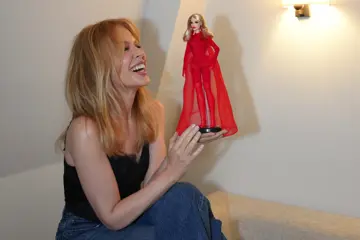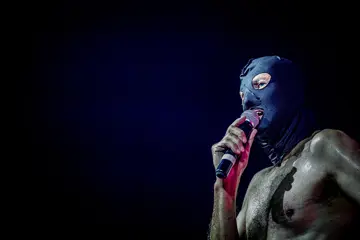Memphis LK is one of Australia’s most promising pop stars.
Utilising sounds from the deepest of underground dance scenes while moulding them with futuristic pop tropes, Memphis is a producer, DJ and songwriter with elite taste.
It’s within this balance that her music and latest EP Too Much Fun becomes so intoxicating. Swirling dance beats from the worlds of garage, jungle, house and trance make for the perfect home for her evocative vocasl.
Too Much Fun is an exploration of fun and everything that it encapsulates. On the surface, the dance beats evoke extreme escapism and nostalgia, calling back to the golden era of dance music which rings beautifully in dark nightclubs, or illuminated festival stages. Take the EP’s opener, Whip, which sees a broken dance beat soar with gorgeous percussion and woozy bass synths. On the same note Tricky’s tapped keys combine perfectly with a classic UKG beat and Coffee’s four to the floor bass would sound even better at 3am.
Beneath the surface, Memphis also faces the reality of having Too Much Fun. While the dance beats bang Memphis’ songwriting is elite, evoking deep emotion of love, heartbreak and the euphoria associated with being young and figuring life out on a whim.
Don't miss a beat with our FREE daily newsletter
Memphis LK’s rise in acclaim has come following years of hard work reshaping and perfecting her now signature sound. Recently she’s supported the likes of Tove Lo, Hayden James and Rina Sawayama, as well as being nominated for Music Victoria’s Best DJ category. She’s also performed huge sets at the likes of Splendour In The Grass, Listen Out, Beyond The Valley, Wildlands and Rhythm and Alps.
Following a massive slot at Beyond the Valley and the release of her EP, we chat to Memphis LK about finding her signature sound, taking ownership over her music, the power of creative independence and the ramifications of having too much fun.
How are you feeling after playing that massive set at Beyond The Valley. I feel like it must be hard battling the blues after big shows?
It was absolutely crazy. They were definitely the best shows that I’ve ever done. Amazing crowd, the best vibe, had so much fun. It was a great day and night after that because it was New Years Eve and I played in the afternoon. After my set I was just hanging out with friends and we got to watch Kaytranada, Nelly Furtado and it was just so good. Best night.
On that note, I love that your set is a hybrid of DJing and performing live. Why do you think DJing rather than doing the traditional singer show reflects your act as Memphis LK best?
I actually started doing the DJ/Live set initially when I started playing shows because I didn’t have much music out. I was wondering how to fill up a whole set so I needed to be versatile. The music that I make is obviously heavily inspired by the music that I would normally play in a DJ set or listen to, so it made sense to join the two together. I was not sure how it would work out, doing the DJ set and mixing my songs in live and singing but it’s been so cool to do. It gives context to my own music. It also means I can be my own hype person as well. I can drop a couple of really fun tracks and throw a couple of my tracks in as well. It’s a fun balance.
It’s cool as well because my set can also work in a lot of different environments. It can go from the club to a festival to a regular show. It’s a nice all rounder vibe.
When was the moment you started to begin to love the energy and power of dance music? What were the experiences that made you feel like I want to make this type of music?
It was when I started discovering more experimental artists. People like Four Tet, Burial and Nicolas Jaar. Even early Grimes. The way that it was electronic but more experimental. The thing I love about those artists is how much emotion they can put into dance music. That’s always something that I’ve strived to do with my music. That was the moment for me that was most inspiring to me. It was the most inspired I’d been listening to music.
How did that transition to music making?
I started from there playing around with looping stuff on Garage band and singing over it. From there I was shown Ableton and that blew my mind. Oh my god, this program can do everything. Despite playing in bands before I started producing, I always had a certain sound in my head that I wanted to be able to make but I didn;t know how. That was the moment where I realised I could make this music now. It was such a cool feeling because I realised I could do it all myself without having to rely on other people.
That was also the moment that I decided I wanted to do music. If I can make it work, this is it.
In 2021 you dropped your first solo EP 1 which really introduced your sound well but it feels like with Too Much Fun you’ve taken that musical foundation and perfected it. How do you reflect back on 1 now?
It was definitely a necessary step in involving my project. I definitely look back on those songs and to me, that was a full on exploration phase for me. I had no idea what my direction was or what my sound was. I was just trying all these different things and seeing what would stick. That was also a period of time where I wasn’t so confident in my production. I was getting my songs to a certain point and getting another producer to finish them for me.
The years that followed that were COVID and lockdowns and that time I didn’t put any music out. I just wanted to get really good at producing so that I don’t need to give my songs to other people then not being happy with the result. Too Much Fun is where I’ve come out the other side with so much clarity in my sound, confidence in my production. I had to take all of those steps to get to where I am now so I’m really grateful for that time. It’s so important to have that stage of exploration and just figuring stuff out. It helped me grow.
How challenging was it to find that balance between pop and dance on Too Much Fun. Was it completely off instinct or was it something you consciously had to balance?
A lot of it is just based on instinct and the sounds that I like. I’ve always loved songwriting and telling stories through songwriting. I want my music to make people feel things. I’ve also been very involved in the club scene and being very inspired by underground sounds. That’s the music that I listen to. So it makes sense my production veers towards those sounds, with the rave and club influence.
On that though, I feel like a song doesn’t feel finished until it evokes an emotion. That’s when I know whether a song is worth following through with, when I’ve found a chord progression, melody or lyrical idea that I’m feeling emotionally.
The project lands at such a perfect time in the context of global dance music. People have become really accepting of underground dance influences in pop music. What do you think has triggered that? What’s changed in the water?
I feel like it is the aftereffects of lockdowns. People want music that makes them feel great. People are craving fun. That’s been my mindset as well with making music. I just want to make fun music that people can have a good time with. Obviously TikTok is a big factor in dance music. It has benefitted so much from it. The whole 90s dance/rave culture sounds and feeling has been blowing up on TikTok for the last couple of years.
There are some very obvious sad bops on the record. They’re fun inducing dance beats and they’re juxtaposed by some sad and heartbreaking lyrics. I love how that relates to the title. You’d think having Too Much Fun would be a great thing, but we’ve all been in situations where having Too Much Fun is detrimental. How do you think the title encapsulates the feeling of the project?
The title for me is definitely a double meaning. At first glance it’s very Oh so fun! but when you listen to the music, there’s some obvious shit going down. Too Much Fun on face value has been my approach to making music in the last year or so. Just having so much fun with it, making music that I enjoy and not overthinking it.
I feel like the title track of the EP though to me is that phase when you break up with someone and you’re convincing yourself that you’re having heaps of fun and that you’re doing heaps better, pretending you’re totally over them but maybe you’re not quite there yet. It’s almost fabricated Fun.
We’ve all been there, but sometimes you need to fake it til you make it.
Yes, it’s all about manifesting the fun.
Supporting Tove Lo must have been a crazy experience. What did seeing an out and out pop star like her perform and kill it on stage teach you about making and performing art generally. What were your reflections after walking out of those shows?
It’s so inspiring seeing a big pop artist do their thing. To have a live show that is so dynamic, well thought out, high energy is just so inspiring and something that I want to have at some point with my live shows.
Also the crowds were really lovely and supportive. That made those shows so much fun. I was pretty nervous for those shows because they were all sold out and when I walked out on stage I had never performed for a crowd that was so attentive. Being used to performing clubs and stuff like that and then to go onto a stage and see everyone silent, watching and present. I was not used to it. It was really cool.
You were the spotify EQUAL ambassador for January, which led to you having a Billboard in Times Square. You spoke extensively while entering the industry about the lack of representation in dance music and now that advocacy has led you to the most visible you’ve ever been. How do you reflect on having the billboard for that reason? How does it make you feel?
I can’t believe it. I still feel like that photo is Photoshopped. It’s surreal. It feels really amazing having put in so much work over a long period of time and a lot of the time it feels like despite putting in that work you don’t get a whole lot back. It can be extremely hard to keep pushing. As I’ve said in other interviews, there can be a lot more self doubt when you’re a woman or non-binary person in the industry for a multitude of reasons. Both from a lack of representation and visibility on the artist side but also the lack of belief in those artists. We are wired to assume that a man has produced a female’s work for some reason.
For that reason I feel really grateful and happy and proud I kept pushing through and now it is the ultimate blessing.
















